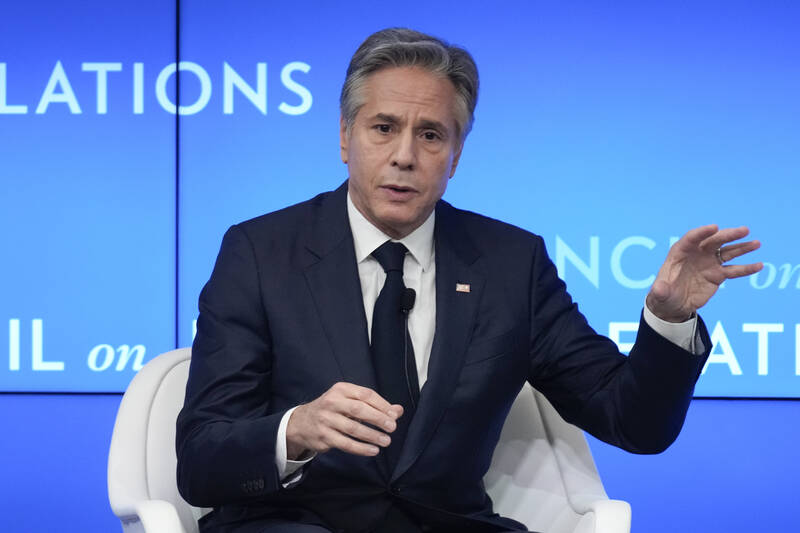The US has taken measures to build a more reliable supply chain through information security cooperation with like-minded partners such as Taiwan, American Institute in Taiwan (AIT) Director Sandra Oudkirk said yesterday.
“The Biden-Harris administration is taking key measures to prioritize and elevate cybersecurity within the United States and with our like-minded partners, including Taiwan,” Oudkirk said, referring to US President Joe Biden and US Vice President Kamala Harris.
She made the remarks at the Taiwan-US Financial Cybersecurity Summit held by the AIT and the Taiwan Academy of Banking and Finance in Taipei.

Photo: George Tsorng, Taipei Times
“Cybersecurity is a shared challenge and handling it will require a shared approach,” she said, adding that the US Department of the Treasury and Taiwan’s Financial Supervisory Commission (FSC) have been working together on the issue, and “already they have accomplished so much.”
Several Treasury officials are in Taiwan to share the US’ experiences at the summit, she said.
Oudkirk also said that the US Department of Commerce is planning a cybersecurity trade mission to Taiwan in September, during which the two sides would follow up on the discussions.

Photo: AP
As the tactics, techniques and procedures of cyberattacks are constantly evolving, “it is critical that we work together as partners to learn from each other and to bolster our critical networks,” she said.
“Here in Taiwan, I have made cybersecurity a key focus of AIT engagement. I am proud of the work we have done together so far,” she said, citing such examples as the Global Cooperation and Training Framework workshops, the Cyber Offensive and Defensive Exercise, and the US-Taiwan Technology, Trade and Investment Collaboration.
President Tsai Ing-wen (蔡英文), who addressed the summit after Oudkirk, said that she has been underlining the concept “cybersecurity is national security” since she took office.
Information security threats are inevitable challenges Taiwan has to face while promoting digital transformation, she said, adding that the identification, assessment and control of information security risks require cooperation among industries.
The government has been improving every aspect of information security protection, including by establishing the Ministry of Digital Affairs in August last year and the National Institute of Cyber Security in February, Tsai said.
It also issued new action guidelines last month to fight online fraud, she said.
The FSC in 2020 introduced the Financial Cyber Security Action Plan and updated it last year to improve resilience to information security breaches, Tsai said.
The Legislative Yuan last month passed amendments to the Banking Act (銀行法), the Securities and Exchange Act (證券交易法) and the Futures Trading Act (期貨交易法) to boost the protection of key financial infrastructure, she said.
On international cooperation, the Financial Information Sharing and Analysis Center has been working with the US since 2019 to share intelligence on information security, Tsai said.
The center joined the Forum of Incident Response and Security Teams in January last year, after which it has signed memorandums of understanding with financial security agencies in many countries, she said.
In other news, US Secretary of State Antony Blinken on Wednesday reiterated that the US continues to be guided by the “one China” policy, based on the Three Joint Communiques, the Taiwan Relations Act and the “six assurances.”
“That hasn’t changed and that won’t change,” he said during a conversation with Council on Foreign Relations president Richard Haass.
“Under the Taiwan Relations Act we’ve had a longstanding policy of making sure that we could do what’s necessary to help Taiwan defend itself,” he said.
“That policy and the sort of rheostat on it also depends a lot on what Beijing is doing or not doing, and that was designed in from the get-go, including in the communiques,” he added.
Additional reporting by staff writer

CHAOS: Iranians took to the streets playing celebratory music after reports of Khamenei’s death on Saturday, while mourners also gathered in Tehran yesterday Iranian Supreme Leader Ayatollah Ali Khamenei was killed in a major attack on Iran launched by Israel and the US, throwing the future of the Islamic republic into doubt and raising the risk of regional instability. Iranian state television and the state-run IRNA news agency announced the 86-year-old’s death early yesterday. US President Donald Trump said it gave Iranians their “greatest chance” to “take back” their country. The announcements came after a joint US and Israeli aerial bombardment that targeted Iranian military and governmental sites. Trump said the “heavy and pinpoint bombing” would continue through the week or as long

TRUST: The KMT said it respected the US’ timing and considerations, and hoped it would continue to honor its commitments to helping Taiwan bolster its defenses and deterrence US President Donald Trump is delaying a multibillion-dollar arms sale to Taiwan to ensure his visit to Beijing is successful, a New York Times report said. The weapons sales package has stalled in the US Department of State, the report said, citing US officials it did not identify. The White House has told agencies not to push forward ahead of Trump’s meeting with Chinese President Xi Jinping (習近平), it said. The two last month held a phone call to discuss trade and geopolitical flashpoints ahead of the summit. Xi raised the Taiwan issue and urged the US to handle arms sales to

State-run CPC Corp, Taiwan (CPC, 台灣中油) yesterday said that it had confirmed on Saturday night with its liquefied natural gas (LNG) and crude oil suppliers that shipments are proceeding as scheduled and that domestic supplies remain unaffected. The CPC yesterday announced the gasoline and diesel prices will rise by NT$0.2 and NT$0.4 per liter, respectively, starting Monday, citing Middle East tensions and blizzards in the eastern United States. CPC also iterated it has been reducing the proportion of crude oil imports from the Middle East and diversifying its supply sources in the past few years in response to geopolitical risks, expanding

Pro-democracy media tycoon Jimmy Lai’s (黎智英) fraud conviction and prison sentence were yesterday overturned by a Hong Kong court, in a surprise legal decision that comes soon after Lai was jailed for 20 years on a separate national security charge. Judges Jeremy Poon (潘兆初), Anthea Pang (彭寶琴) and Derek Pang (彭偉昌) said in the judgement that they allowed the appeal from Lai, and another defendant in the case, to proceed, as a lower court judge had “erred.” “The Court of Appeal gave them leave to appeal against their conviction, allowed their appeals, quashed the convictions and set aside the sentences,” the judges